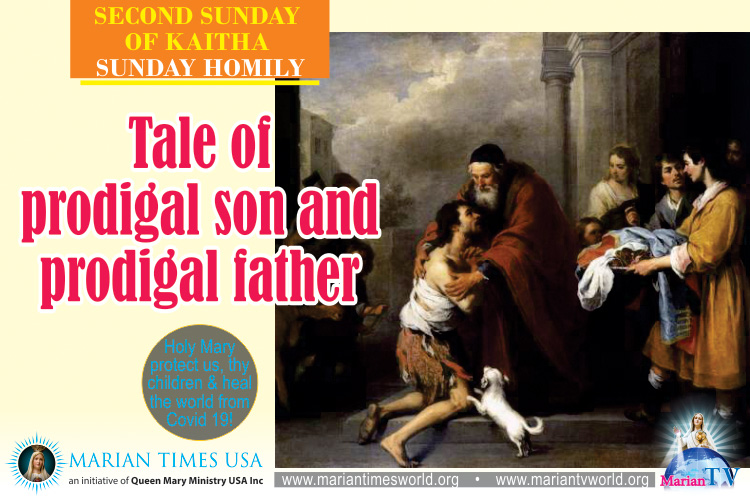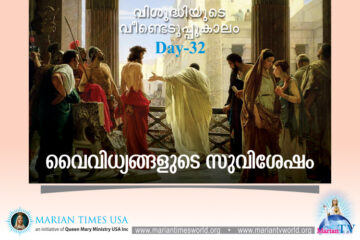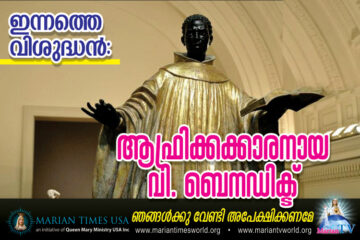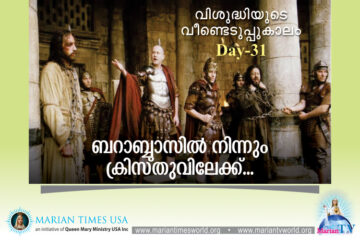TALE OF PRODIGAL SON AND PRODIGAL FATHER


~ Fr. Abraham Mutholath, Chicago, USA. ~
HOMILY SECOND SUNDAY OF KAITHA
INTRODUCTION
Here is a famous and much reflected parable on the prodigal son who when returned to his father with sincere contrition was well received unconditionally by his forgiving father. This son is symbolic of all who commit sin and willing to repent. The first part of the parable shows God’s earnest desire for our repentance and great mercy awaiting us from God. Such was the great experience of the Tax-collectors and Publicans during the public ministry of Jesus. As a double-edged parable, the second part of the parable is more important. The elder son, who represented the Pharisees, the Scribes and the like, was unwilling to accept his returned brother. Jesus wants us to go far beyond our ordinary behavior of jealousy and selfishness and imitate God’s generosity to forgive and support others while we also remain faithful to God.
The Bible Text
Luke 15:11-32
The Parable of the Lost Son.
(11) Then he said, “A man had two sons, (12) and the younger son said to his father, ‘Father, give me the share of your estate that should come to me.’ So the father divided the property between them. (13) After a few days, the younger son collected all his belongings and set off to a distant country where he squandered his inheritance on a life of dissipation. (14) When he had freely spent everything, a severe famine struck that country, and he found himself in dire need. (15) So he hired himself out to one of the local citizens who sent him to his farm to tend the swine. (16) And he longed to eat his fill of the pods on which the swine fed, but nobody gave him any. (17) Coming to his senses he thought, ‘How many of my father’s hired workers have more than enough food to eat, but here am I, dying from hunger. (18) I shall get up and go to my father and I shall say to him, “Father, I have sinned against heaven and against you. (19) I no longer deserve to be called your son; treat me as you would treat one of your hired workers.”’ (20) So he got up and went back to his father. While he was still a long way off, his father caught sight of him, and was filled with compassion. He ran to his son, embraced him and kissed him. (21) His son said to him, ‘Father, I have sinned against heaven and against you; I no longer deserve to be called your son.’ (22) But his father ordered his servants, ‘Quickly bring the finest robe and put it on him; put a ring on his finger and sandals on his feet. (23) Take the fattened calf and slaughter it. Then let us celebrate with a feast, (24) because this son of mine was dead, and has come to life again; he was lost, and has been found.’ Then the celebration began. (25) Now the older son had been out in the field and, on his way back, as he neared the house, he heard the sound of music and dancing. (26) He called one of the servants and asked what this might mean. (27) The servant said to him, ‘Your brother has returned and your father has slaughtered the fattened calf because he has him back safe and sound.’ (28) He became angry, and when he refused to enter the house, his father came out and pleaded with him. (29) He said to his father in reply, ‘Look, all these years I served you and not once did I disobey your orders; yet you never gave me even a young goat to feast on with my friends. (30) But when your son returns who swallowed up your property with prostitutes, for him you slaughter the fattened calf.’ (31) He said to him, ‘My son, you are here with me always; everything I have is yours. (32) But now we must celebrate and rejoice, because your brother was dead and has come to life again; he was lost and has been found.’”
Interpretation
Only St. Luke presents this parable and not by any other evangelist. A parable is a story with a spiritual message. However, some of the storiesare partially or fully allegorical. This story is almost allegorical in the sense that the situation and characters are representing the people and circumstances of the time.
There are differences of opinion on the name to identify thisstory. Traditionally, the parable has been known as the “Parable of the Prodigal Son.” Some scholars observe that the focus then went to the lost son rather than the father who forgave him and responded to the resentment of the elder son. Since the father is the central character of the story, many consider this as the “Parable of the Forgiving Father.”
(11) Then he said, A man had two sons
In an allegorical sense, the father stands for God the Father, the elder son represents the people of higher strata like Pharisees and Scribes, and the younger son signifies the Tax-collectors and Sinners. All of them were children of God. However, the Pharisees and Scribes considered themselves as the obedient children of God and always faithful to Him. They considered the Tax-collectors and Sinners as disobedient and slanderous children of God.
(12) and the younger son said to his father, ‘Father, give me the share of your estate that should come to me.’ So the father divided the property between them.
The younger son demanded for the share of his father’s property that would come only at the death of the father. His demand was insulting because it could mean that he wished that his father be dead so he could be free from father’s discipline and inherit early the property for which he never labored. His only reason for demanding the property was his birthright. He did not care about his responsibility to his father. He had ignored the law, “Honor your father and your mother, as the LORD your God has commanded you, so that your days may be long and that it may go well with you in the land the LORD your God is giving you.” (Deuteronomy 5:16).
The younger son’s behavior was like that of the first parents who owned nothing but inherited everything from God, their father. There is no mention of a mother in both stories of Adam and the prodigal son. The first parentsattempted for independency under the influence of Satan. Since the younger son was single, probably he was in his late teens and not mature enough. He might have been misguided by his juvenile friends to fight for his freedom.
The Jews would normally divide the property only at the end stage of the father’s life. Sirach 33:22 and 24 instructed: “When your few days reach their limit, at the time of death distribute your inheritance.” (v. 24). “Far better that your children plead with you than that you should look for a handout from them.” (v.22). However, this father showed the generosity out of persistence from his younger son. Similarly, God toleratedetermined sinners to stay away from him.
According to the Jewish tradition, the younger son would receive only half of what the elder one was eligible to receive (Deut. 21:17). Father would have divided the property according to the custom. So, the younger son might have received one third of the whole assets. The elder son would receive a two third portion that the father continued to manage with him.
(13) After a few days, the younger son collected all his belongings and set off to a distant country where he squandered his inheritance on a life of dissipation.
The younger son went with his inheritance to a far country like Antioch, Alexandria, Rome, or Corinth to be out of reach of his father. He abandoned the Holy Land, the Temple of Jerusalem, synagogues and fellow Jews to be away from God and the Jewish observances. He was seeking a gentile and sinful city. He might have engaged in paganfestivals. The meaning of prodigal is thriftless. Since he did not work for money, he did not know the value of hard-earned money. So, he misused the money he inherited and did not care about his future.
(14) When he had freely spent everything, a severe famine struck that country, and he found himself in dire need.
Severe famines were natural during those days. The younger son had freely spent everything he had without any caution. He became homeless and friendless. The dire need was for his survival and necessities of life. Spiritually,his poverty was setting the backdrop for his conversion. Unfavorable circumstances might help a person to turn back to God.
(15) So he hired himself out to one of the local citizens who sent him to his farm to tend the swine.
Out of poverty and unemployment in the region, the prodigal son ended up in serving a gentile feeding his swine. Both working for a gentile and feeding pigs were humiliating for a Jew. Besides his physical hunger, this would cause him mental agony. He, who was like a prince before, had ended up becoming less than a slave.At that time, he did not think of going back to his father because he knew that he had received all he could inherit from the father and had broken up his relationship with him. However, he did not know that his father was eagerly awaiting his return. Father knew that once the prodigal son slandered everything, he would learn his lesson and return to him for help.
(16) And he longed to eat his fill of the pods on which the swine fed, but nobody gave him any.
This shows the pathetic situation of the prodigal son. Pigs were in a better position than him. They had food to eat. Though employed, the employer was exploiting him. He had no food, no money, and no one gave him anything. The friends who might have enjoyed plenty of expensive food and fun at his expense before had already disappeared. He felt like alone without any human connection. He longed to eat the animal food competing with the pigs to satisfy his hunger and to survive. The employer might have been even restricting him on sharing the food with the pigs.
(17) Coming to his senses he thought, ‘How many of my father’s hired workers have more than enough food to eat, but here am I, dying from hunger.
The prodigal son reflected on his past glorious condition at his father’s house. No human, but God, might have given him the insight to reconcile with his father. His goal for returning to the father was to ask for a job so he could at least have some human food for survival. He had never worked when he was with his father. He knew that he was not worthy to ask for sonship and its privileges. He was fortunate that such a thought came to his mind. That was arecovery stage that Judas who betrayed Jesus missed. If Judashad repented before his death, he could have been physically, emotionally and spiritually saved. The first parents Adam and Eve, Cain and many others in the Holy Bible were justifying themselves for their faults instead of repenting and confessing their sins. This is the critical stage of transformation that we need in our lives.
(18) I shall get up and go to my father and I shall say to him, “Father, I have sinned against heaven and against you.
The son devised a step by step plan of action for his reconciliation with his father. His first step was to get up and abandon the life with the unclean animals. That should be the primary step for any sinner who lives in sinful addiction or friendship. Second step was his travel back to his father in haste. He coined the words for his confession. He was not asking any favor; but was planning to acknowledge his sin that was against God and against his father. He knew that he did wrong against the design of God for family and the commandment to honor parents. He became a transformed person when he reached his father. His proud mentality turned into humility and repentance. That is what God expects from us sinners.
The prodigal son’s only hope was in the mercy of his father. He knew that only his father, and no one else like his employer, former friends, or his elder brother would be willing to help him in that dire need. He might have observed the forgiving and loving attitude of his father from his experience in his family.Whether a sinner or a misunderstood innocent, there might be situations when no judge or even a family member might understand or pardon us. Still, we have hope in God through Jesus Christ.
(19) I no longer deserve to be called your son; treat me as you would treat one of your hired workers.”’
The prodigal son decided to acknowledge humbly to his father his unworthiness to be called his son. He had lost his sonship by claiming and receiving his inheritance that he could get only at the death of his father. He wanted to ask the father that he be considered as a hired worker.
(20) So he got up and went back to his father. While he was still a long way off, his father caught sight of him, and was filled with compassion. He ran to his son, embraced him and kissed him.
The prodigal son did as he planned. However, things did not happen the way he expected. The father saw him from a distance as if he was eagerly awaiting the return of his dear son. Before he could confess with his preplanned script, the father took the initiative to express his compassion and love by embracing and kissing him. This was far beyond the expectation of the son. He might have anticipated that his father might first reject him,disregard him, scold him, humiliate him, question him or at least set conditions for his employment. None of these happened. In fact, it was the father who was more joyful in the reconciliation than the repentant son.
(21) His son said to him, ‘Father, I have sinned against heaven and against you; I no longer deserve to be called your son.’
After the embrace and the kiss, the son got the courage to make his confession before the father with a since expression of his regret. The same sentence that he planned was said. However, he could not complete his pre-planned full version of confession. Before he could say, “treat me as you would treat one of your hired workers” the father interrupted the confession because he could not see his son humbling more than that. A son is always a son and a father always a father regardless of any broken relationship between them. The father had already accepted the lost son with full rights as expressed in his embrace and kiss. Our repentance is expressed more in our attitude than in the words we recite.
(22) But his father ordered his servants, ‘Quickly bring the finest robe and put it on him; put a ring on his finger and sandals on his feet.
The father did not reply to the confession of the son and did not demand any condition. His unconditional forgiveness was expressed in his words to the servants and in his action. The prodigal son received far more than what he wished and asked.
The story gives details of acceptance and recognition the father gave to his returned son. The father did these in haste. He did not wait to test the changed behavior of this son or wait for the return of his elder brother from the field. The father was enthusiastic to accept and honor his son in front of his servants and slaves.
finest robe
The son returned with a dirty, smelling, and torn dress like a beggar. His poor dressing was symbolic of his pathetic situation. The father asked his servants to dress the returned son with finest robe which could be a symbol of his position in the family distinct from the servants and slaves.
ring on his finger
Ring was symbolic of sharing father’s authority. The signet ring was like an official seal or credit card of the modern times. It was used to sign documents and give assurance for any credit that would be paid by the father. When Pharaoh made Joseph his prime minister, he gave a ring as sign of sharing his authority in the palace. “And Pharaoh took off his ring from his hand, and put it upon Joseph’s hand, and arrayed him in vestures of fine linen, and put a gold chain about his neck.” (Genesis 41:42). The prodigal son was honored and empowered in a similar way.
sandals on his feet
Sandals were symbol of family membership and authority. Others like servants and slaves were not allowed to wear sandals.
(23) Take the fattened calf and slaughter it. Then let us celebrate with a feast
“The fattened calf”meant a specific calf specially fattened by families for special occasions like offering as sacrifice in the temple or to be killed for banquets in honor of distinguished guests. The slaughtering of the fattened calf showed the great joy and enormous celebration at the return of the son communicating to all gathered that the return of the son waswell accepted with full rights in the family.
The sacrifice of a calf for the recovery of the prodigal son is paralleled by scripture scholars to the sacrifice of Jesus for the redemption of the sinful mankind. Just as father sacrificed his favored calf, God the Father let his son die on the cross as ransom for the recovery of humans for their wretched state of sin. Christ continues to nourish us with his flesh and blood when we gather in his name to enjoy the spiritual banquet of Holy Mass in the church.
(24) because this son of mine was dead, and has come to life again; he was lost, and has been found.’ Then the celebration began.
The father was justifying to his servants for the unusual joy and celebration. The disappearance of the son was cause of great grief for the father and was more painful than death of a son. The son’s sinful behavior was his spiritual and moral death like that of Adam when he lost the paradise because of his misuse of freedom. Through his self-repentance and confession, the prodigal son came back to life. That became complete only with the generous and forgiving acceptance of the father. The father considered the return of the lost son like a resurrection.
(25) Now the older son had been out in the field and, on his way back, as he neared the house, he heard the sound of music and dancing.
This parable is considered as a double-edged parable because it has two parts with double message. The message of the first part was the magnanimity of God the Father to offer unconditional forgiveness to the repentant and the extraordinary joy of God the Father in the conversion of sinners. Before presenting this parable, Luke presented the parable of the lost sheep (Luke 15:1-7) and the parable of the lost coin (Luke 15:8-10). Both preceding parables were giving importance to the unusual rejoicing in the lost and found. However, these examples do not have repentance element because they deal with sheep and coin. The parable of the Forgiving Father also emphasizes the great joy of the lost and found in the first part and proceeds with a second part that gives importance to the need of theso called “righteous” to join father’s magnanimity in accepting the repentant sinners. For a double-edged parable, the message of the second part has precedence over the first. The reason is that the parables of the lost sheep, the lost coin, and the prodigal son were addressed to the Pharisees and Scribes when they complained against Jesus for welcoming sinners and eating with them (Luke 15:1-3).
Music and dancing
The great celebration with music and dancing along with banquet was like rejoicing with friends and neighbors after finding the missed items in the previous two parables of the lost sheep and lost coin.
Now the older son had been out in the field
The elder son was not an eye-witness of the return of the younger one. He was out in the fieldengaging in his work. When he returned home, he noticed the unusual celebration of which he had no idea.
(26) He called one of the servants and asked what this might mean. (27) The servant said to him, ‘Your brother has returned and your father has slaughtered the fattened calf because he has him back safe and sound.’
It was natural that the elder son might ask what was going on. The father did not inform him of the return of the younger son; nor did the father consult him on the celebration. He might have felt like the father giving too much love and undeserving honor to the younger son while ignoring him. Probably he would have no problem accepting the younger brother as a paid laborer. His objection was because father gave him more than what he asked and deserved. The elder son felt that he would lose a portion of what he had earned with his father. He was uncharitable and selfish.
There was similarity in the elder brother’s approach to the Pharisees and Scribes while Jesus was favoring the “unrighteous”. Like the younger son, the tax-collectors and publicans had been living in sin. Jesus was forgiving their transgressions and accepting them as his disciples like Matthew the tax collector and offering salvation to families like that of Zacchaeus.
(28) He became angry, and when he refused to enter the house, his father came out and pleaded with him.
The elder son resisted to enter the house and join the festivities. The loving father noticed the negative reaction of his elder son. He noticed that while the one who had abandoned him once was inside the house, the other who was always inside was staying outside in protest. As Jesus taught, “So the last will be first, and the first will be last.” (Matthew 20:16).
The father showed his compassion also to the older son. The father went to meet the elder son and pleaded him to get reconciled with him and the younger son. The elder son’s protest was more to the father than to the younger son. He was upset that the fatted calf was killed. He felt that he who had been obedient and submissive to the father was never acknowledged like the reception given to the prodigal son.
(29) He said to his father in reply, ‘Look, all these years I served you and not once did I disobey your orders; yet you never gave me even a young goat to feast on with my friends.
Like the Pharisee who went to pray in the Temple in “The Parable of the Pharisee and the Tax Collector” (Luke 18:9-14), the elder son recited how he had been serving and obeying the father. In contrast, the younger son did never serve the father nor obey him. The father seemed to do undue favor to the prodigal son. The elder one complained that the father had not given him even a young goat to celebrate with his friends. He was contrasting himself with his younger brother and complaining on the contrast of the father’s treat to both. He felt jealous of his brother.
(30) But when your son returns who swallowed up your property with prostitutes, for him you slaughter the fattened calf.’
It is natural that when we hate someone we go to the extremes to find fault and accuse that person. The elder son detached himself from his brother and said, “your son” expressing his rejection of the younger one as his brother. He accused the younger one of swallowing father’s property though the father gave it to the younger son as free will. Next, he accused that the younger son was mingling with prostitutes which was not mentioned in the first part of the story. So, it could be an imagination of the elder brother to put down the prodigal son. He also felt that the celebration was done in a hurry without getting any assurance of good behavior or finding out what he would demand later. Above all, he could not tolerate that the fattened calf preserved for special celebrations was killed.
(31) He said to him, ‘My son, you are here with me always; everything I have is yours. (32) But now we must celebrate and rejoice, because your brother was dead and has come to life again; he was lost and has been found.’”
The father wanted the elder son to accept his brother as the father did. He justified for his action because he repeated what he had told the servants that his spiritually and morally dead son had returned to life. Such was the great feeling of the father. In the allegorical sense, God was with the Israelites throughout the centuries being faithful to his covenant with them as His firstborn. When Jesus came, the sinners and ordinary people responded expressing their willingness to join his church, the Jews expressed their resistance and rejected Jesus.
An open-ended story
The story did not end but was to continue in the sense of an allegory. Jesus did not conclude whether the elder son continued his protest, or left the father and the younger son, or entered the house and joined the celebration, or whether he accepted the younger brother and lived in harmony. The Pharisees, the scribes and other high-class people of the Jews were to decide the future of the story. Later we know that they did not accept the people who represented the younger son because they were mainly of the lower strata of the community. They crucified Jesus, the God incarnate. They expelled Christians from synagogues and persecuted the early church that was composed of former Jews and non-Jews.
Message
- Like the younger son, we naturally tend to be free from religious and moral restrictions. Our attempts for worldly happiness oftentimes lead us to ill-health, economic crisis, and demoralization.
- In our shameful and dire need, no one might be there to support us. Still, we can turn to God our Father who would welcome us with our elder brother, Jesus Christ.
- In the story of the Forgiving Father, he was eagerly waiting for the return of his son. So also, God is eagerly waiting for the return of us who are his children. When we show sign of repentance, God comes down to greet and embrace us as the father did to his prodigal son.
- Confession of the prodigal son changed his life. We also need to come to our senses, go to God through confession, get reconciled with God. That can change our life in this world and the world to come.
- We notice the father’s approach in reaction of Jesus to the repentant sinners. He never questioned them but only said, “Your sins are forgiven,” “sin no more.” In Matthew 11:28 Jesus said, “Come to me, all of you who are weary and carry heavy burdens, and I will give you rest.”
- Through this story, Jesus was also communicating that regardless of our unworthiness, God the father is awaiting our return to the Father through our repentance. Unlike the elder brother of the prodigal son, our elder brother Jesus is not only welcoming us to the lost sonship but also came down to convince us to return to the Father assuring ahead of time that the Father is willing to forgive us.
- Sin or repentance leads to reversal of spiritual status. When the prodigal son committed sin, he lost his “paradise” and ended up in hell-like situation. When he repented and reconciled with God, his status reversed from “hell” to “paradise.” We have the freedom to choose and it is God’s grace that He is willing to reinstate our sonship when we repent.
- Each character in this story has a message for us. Like the prodigal son, we need to turn to God with repentance. Like the father in the parable, we need to be compassionate to others. Unlike the elder son in the parable, we should desire the betterment of
മരിയന് ടൈംസിലെ ഇന്നത്തെ പ്രധാനപ്പെട്ട അപ്ഡേറ്റുകള് താഴെ ലഭിക്കുന്നതാണ്.









